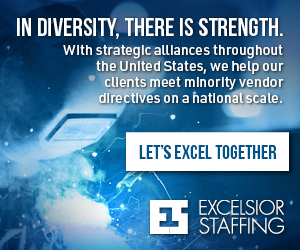Protecting the American People Against Invasion is a January 2025 Executive Order maximizing immigration enforcement. U.S. Immigration and Customs Enforcement (ICE) agents are prioritizing law enforcement relevant to illegal entry and unlawful presence of undocumented individuals in the country.
Removing unauthorized immigrants from the United States will substantially impact industries such as manufacturing that employ large numbers of immigrants. All employers, including staffing agencies, should prepare for potential action and possible penalties.
Potential Impact of Worksite Investigations on the Staffing Industry
The increasing emphasis on immigration enforcement means more government worksite enforcement investigations can impact the staffing industry:
- ICE agents use worksite raids to identify and/or detain individuals unlawfully in the country.
- Staffing agencies, client companies, and other employers that knowingly retain unauthorized workers can face steep fines and penalties.
- The Secretary of Homeland Security assesses and collects the fines and penalties to discourage unlawful entry and employment of immigrants.
Maintaining compliance with immigration laws
Staffing agencies and client companies can take these steps to ensure compliance with immigration laws:
- Anticipate increased Form I-9 audits, immigration enforcement actions, and site visits related to immigration compliance.
- Conduct comprehensive I-9 audits.
- Evaluate hiring and onboarding practices to ensure compliance.
- File visa extensions early.
- Partner with immigration lawyers.
- Create contingency staffing plans to minimize business disruptions.
Impact of noncompliance with immigration laws
Noncompliance with immigration laws can have the following results:
- Expensive fines and penalties
- Uncontrolled loss of labor
- Loss of contracts with client companies
Potential Impact of Worksite Enforcement on Staffing Agencies
Industries that rely on temporary or seasonal labor will be especially affected by stricter immigration measures:
- Tighter approval criteria and increased scrutiny of H-1B visas for highly skilled workers will limit the availability of foreign talent in industries such as engineering.
- Stricter regulations on H-2B visas for temporary and seasonal labor could reduce the number of available workers in industries such as manufacturing.
- Staffing agencies must develop innovative methods to find and place qualified workers in the U.S.
- Quick adaptation to the tightening immigration restrictions is required to maintain business operations.
- Removing millions of undocumented workers could disrupt the labor market.
Immigration Enforcement and Staffing Challenges
Tightening immigration policies, declining birth rates, and an aging workforce contribute to US labor supply issues. The increasing skills gap means more jobs remain unfilled.
The current government administration wants jobs to return to America. However, stricter visa regulations and increased deportation efforts expand the problem of who will fill these jobs.
Staffing agencies and other employers should upskill and reskill employees to address the growing labor shortage. Offering training programs and collaborating with employers builds pipelines of skilled workers. Advancing employees to higher-paying, more in-demand jobs helps companies maintain business operations.
How Immigration Enforcement Can Affect Contingent Workforce Programs
The increasing focus on immigration could impact contingent workforce programs in these ways:
- Contingent workforce reduction: The number of workers available due to individuals being detained or proactively taking themselves out of the workforce could be reduced. For instance, an ICE enforcement action could cause workers to panic, flee, and not return.
- Additional penalties for employers: Companies retaining unauthorized workers, including those hired through third parties, can be assessed civil and criminal penalties for compliance violations.
- Adverse economic impacts: A substantial reduction in the labor force for manufacturing and other blue-collar jobs can lead to growing costs for labor, goods, and services. As a result, some businesses might struggle to maintain operations.
Dual Compliance Requirements for Form I-9
In addition to federal agencies, many state governments are scrutinizing employers’ Form I-9 compliance. This dual-layered enforcement means staffing agencies and client companies must adhere to federal and state regulations to maintain a lawful workforce and avoid penalties.
Arizona, Mississippi, and South Carolina are among the states with stringent laws requiring employers to use E-Verify, the federal electronic employment verification system. Non-compliance with the Legal Arizona Workers Act, Mississippi’s Employment Protection Act, South Carolina’s Illegal Immigration Reform Act, or other relevant state laws can lead to penalties, including the suspension or revocation of business licenses.
Strategies for navigating dual compliance
The complexity of navigating federal regulations and varying state compliance requirements increases administrative burdens and risks of Form I-9 non-compliance. Staffing agencies and client companies should consider using these strategies to maintain dual compliance:
- Stay informed: Regularly review federal and state employment verification laws to maintain compliant hiring practices. Resources such as the U.S. Citizenship and Immigration Services (USCIS) website and state government portals provide current information.
- Provide comprehensive training: Regularly train the Human Resources team on the nuances of federal and state I-9 requirements and compliance updates to prevent errors during the hiring process.
- Use compliance tools: Leverage electronic I-9 management systems to ensure efficiency and accuracy in multi-jurisdictional compliance.
How the Staffing Industry Can Maintain Compliance with Immigration Laws
Because of the increasing ICE enforcement actions, staffing agencies and client companies should follow these guidelines to ensure compliance with immigration laws:
- Regularly audit employment practices and Form I-9s.
- Implement compliance measures covering relevant employment policies.
- Remain current on changes to immigration and enforcement policies.
- Develop and implement ICE enforcement protocols at headquarters, offices, and field locations. Include compliance contacts trained on ICE enforcement actions to refer the government to during an enforcement action.
- Prepare a Crisis Response Team and strategy.
- Train company leaders on the response plan for ICE enforcement actions.
- Educate leadership, Human Resources, and compliance teams on ICE enforcement actions, including which documents ICE can show up with, the authorized and unauthorized actions, and employer and employee rights.
- Identify internal and immigration counsel to contact if ICE arrives at a worksite.
Strategies for Staffing Agencies to Become Strategic Partners
Staffing agencies can implement these tips to develop strategic partnerships with client companies:
- Anticipate and mitigate risks in hiring and employment law.
- Forecast and collaboratively troubleshoot issues.
- Use data-based recruitment strategies to attract talent at all levels.
- Build domestic talent pipelines to fill clients’ staffing needs.
- Collaborate with clients to build contingency staffing plans.
- Keep clients updated on hiring and employment laws and regulations and how they could impact their business.
- Partner with immigration lawyers to provide clients with educational workshops, compliance toolkits, referrals for legal advice, and immigration audit support.
Partner with The Ōnin Group
Sources:
- https://www.staffingindustry.com/editorial/cws-30-contingent-workforce-strategies/immigration-crackdown-is-your-program-prepared-
- https://www.linkedin.com/pulse/impact-trump-administration-policies-staffing-the-ash-group-evsec
- https://www.linkedin.com/pulse/immigration-policy-job-creation-future-staffing-brad-bialy-rscje
- https://mybasepay.com/6-of-the-most-pressing-legal-issues-for-staffing-firms-in-2022/
- https://www.hrlogics.com/dual-compliance-managing-federal-and-state-i-9-regulations-in-2025
- https://info.recruitics.com/blog/how-staffing-firms-should-pivot-if-new-immigration-laws-are-implemented#:~:text=Staffing%20firms%20can%20partner%20with,prepare%20for%20potential%20immigration%20audits.






